PL/SQL Cursor Exercises: Show the uses of implicit cursor without using any attribute
PL/SQL Cursor: Exercise-4 with Solution
Write a program in PL/SQL to show the uses of implicit cursor without using any attribute.
Sample Solution:
Table: employees
employee_id integer first_name varchar(25) last_name varchar(25) email archar(25) phone_number varchar(15) hire_date date job_id varchar(25) salary integer commission_pct decimal(5,2) manager_id integer department_id integer
PL/SQL Code:
DECLARE
emp_first_name VARCHAR2(35);
emp_last_name VARCHAR2(35);
zemp_id NUMBER:=&employee_id;
BEGIN
SELECT first_name,
last_name
INTO emp_first_name, emp_last_name
FROM employees
WHERE employee_id = zemp_id;
dbms_output.Put_line ('Employee name: '
|| emp_first_name
||' '
||emp_last_name);
EXCEPTION
WHEN no_data_found THEN
dbms_output.Put_line ('There is no employee with the ID '||to_char(zemp_id));
END;
/
Sample Output:
SQL> / Enter value for employee_id: 485 old 4: zemp_id NUMBER:=&employee_id; new 4: zemp_id NUMBER:=485; There is no employee with the ID 485 PL/SQL procedure successfully completed. SQL> / Enter value for employee_id: 147 old 4: zemp_id NUMBER:=&employee_id; new 4: zemp_id NUMBER:=147; Employee name: Alberto Errazuriz PL/SQL procedure successfully completed. PL/SQL opens an implicit cursor with the SELECT INTO statement and after the SELECT INTO statement completes, closes the implicit cursor.
Flowchart:

Go to:
PREV : Write a program in PL/SQL to find the number of rows effected by the use of SQL%ROWCOUNT attributes of an implicit cursor.
NEXT : Write a program in PL/SQL to show the uses of SQL%FOUND to determine if a DELETE statement affected any rows.
Improve this sample solution and post your code through Disqus
What is the difficulty level of this exercise?
